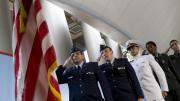Harvard today announced that it had agreed with the United States Army to establish a limited on-campus presence for an Army Senior Reserve Officers Training Corps (SROTC), with the University assuming the costs of student participation in the program. The Army's professor of military science at MIT will now have office hours on the Harvard campus, and can provide on-site mentoring to cadets.
The agreement follows by a year the agreement to have a Navy ROTC presence on campus, following repeal of the "Don't Ask, Don't Tell" policy that had disqualified openly gay men and women from military service.
As before, the programs will be based at MIT, the armed services' local area campus for such training. At other institutions, such as Yale—which earlier agreed to two military-training programs—the ROTC programs are academically based on that campus (there is no other regional ROTC program nearby), with formal recognition for the military personnel as Yale-affiliated academic instructors.









